Congresswoman and Mom of 2 Speaks Candidly About Her Incurable Brain Disease: 'I'm Too Young for This' (Exclusive)
Virginia Rep. Jennifer Wexton opens up to PEOPLE about her diagnosis of progressive supranuclear palsy — or "Parkinson's on steroids" — a rare and degenerative disorder that's forcing her into early retirement
Virginia Rep. Jennifer Wexton, 55, revealed in April 2023 that she had been diagnosed with Parkinson's disease
In September her diagnosis was upgraded to progressive supranuclear palsy, a rare and incurable brain disorder that rapidly deteriorates mobility and speech
Wexton, once a rising star in Congress, is now opening up about her health journey as she prepares to retire at the end of the year
Jennifer Wexton was gearing up for her third term as a United States congresswoman in late 2022 when she received the difficult news that, even if she felt she had a lot left to give to the people of Virginia's 10th Congressional District, her body didn't.
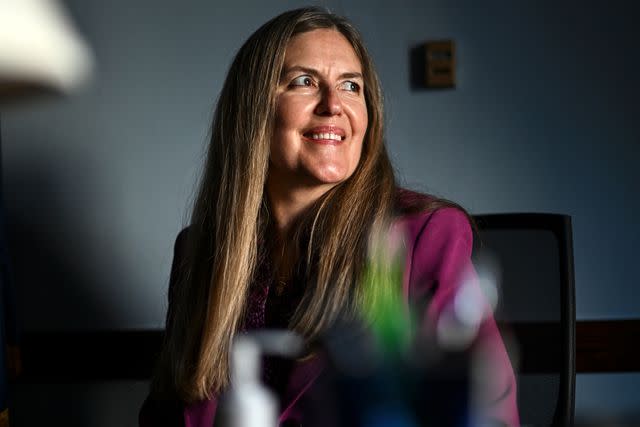
Ricky Carioti/The Washington Post via Getty
"Cognitively, I'm the person I've always been," Wexton, 55, tells PEOPLE, her voice muffled and speech somersaulting. "But there are things that it takes me a lot longer to do."
Less than two years ago, the rising Democrat from Leesburg, Va., had a clear vision for her future. She entered Congress in 2018 with a few key bipartisan goals — including fighting childhood cancer in honor of a young girl in Wexton's community who died of an inoperable brain tumor.
Related: Democrats Take Back Control of U.S. House with Sweeping 2018 Victories
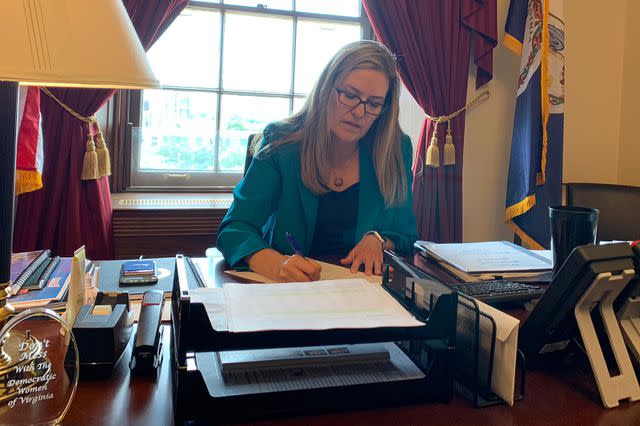
Courtesy of the Wexton Office
Rep. Jennifer Wexton at work in her congressional office before her health challengesHer legislative roadmap was threatened shortly after the 2022 election, when involuntary clenching and curling in her fingers and toes forced her to get an examination that led to a Parkinson's diagnosis.
"I was like, 'Parkinson's? I can't have Parkinson's!' " Wexton recalled, noting that as a woman in her 50s, her risk factors were especially low. "It was hard for me to deal with it at first."
Related: Celebrities Who've Opened Up About Their Battles with Parkinson's Disease
The congresswoman publicly revealed her diagnosis in a video posted on April 11, 2023 — World Parkinson's Day — when she explained that, despite being a private person, she wanted to be transparent about her health journey and reassure constituents that she planned to continue serving in Congress "for many years to come."
"Over the past few months, [Parkinson's] has primarily affected my speech and how my mouth moves. You may notice I speak more quickly now," she said in the video. "It also has affected how I walk and keep my balance."
"What Parkinson’s is not is an untreatable disease, a cognitive impairment, or a death sentence," she continued. "So please! You are welcome to empathize, but don’t feel sorry for me."
Wexton embraced an outpouring of affection from around the country after her announcement, and back home, she joined a support group for women with Parkinson's to cope with the changes.
But as time passed, she couldn't shake the feeling that she was different from the other women who shared her diagnosis. "My symptoms were progressing much faster than everybody else's," she remembers noticing.
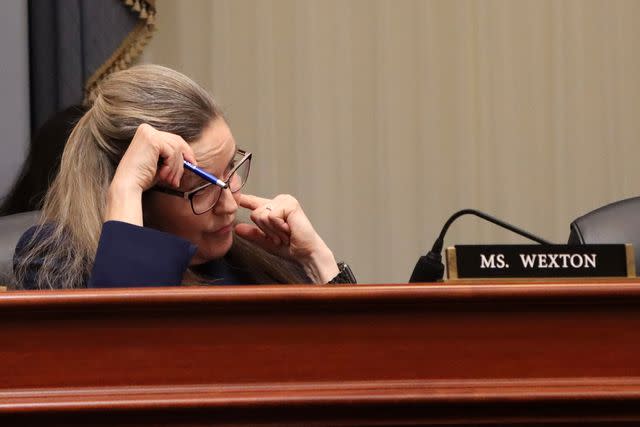
Courtesy of The Wexton Office
Virginia Rep. Jennifer Wexton attends a 2024 House hearing amid her new health challengesHer doctor suggested she undergo an MRI, and by the fall of 2023 her diagnosis had changed. Wexton learned she has progressive supranuclear palsy — or PSP — a rare and incurable brain disorder with a prognosis of about six to nine years.
"I asked the doctor if I could still run for office again, and he said, 'Well, why would you want to?' " Wexton recalls. The doctor explained its fast-progressing nature, that she may soon need a walker and that many patients develop severe disability within the first few years.
"It was very upsetting," the mother of two concedes. "I'm too young for this."
Related: Virginia Congresswoman Will Not Run for Reelection After Rare Neurological Disorder Diagnosis
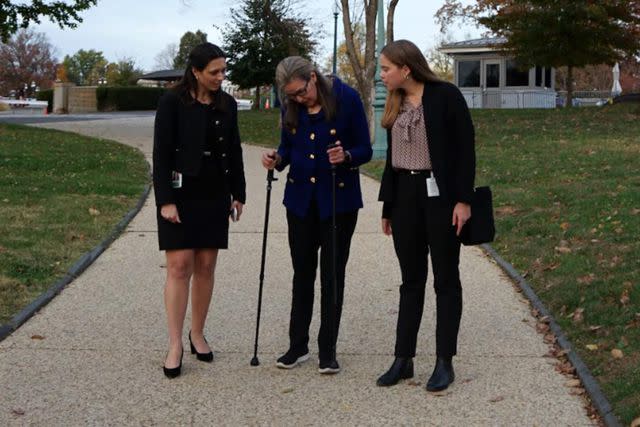
Courtesy of the Wexton Office
Jennifer Wexton stands with aides, using walking poles as her mobility declines from PSPWexton made national headlines in 2018 when she flipped the first House seat of election night, defeating incumbent Rep. Barbara Comstock and becoming the first Democrat to represent her district in nearly 40 years.
"I didn't know if I would win," she remembers thinking. "I had a lot of stuff to do to get ready to be in Congress, but it was very exciting for me."
Her race was a precursor of the historic hours and days that would follow. Around the nation, with the #MeToo movement still fresh on voters' minds, Democrats picked up a total of 41 House seats — largely attributed to a score of passionate female candidates determined to narrow the representation gap and return the speaker's gavel to Nancy Pelosi.

Courtesy of the Wexton Campaign
President Barack Obama visits the campaign offices of Virginia Sen. Tim Kaine and House candidate Jennifer Wexton in 2018Though Wexton set out for Capitol Hill less than six years ago, her ties to Washington run deep. She grew up in the D.C. suburbs, the child of economists for the federal government, and completed a bachelor of arts at the nearby University of Maryland.
After earning her juris doctor from William & Mary Law School, she worked as both a private attorney and prosecutor in Loudoun County, Virginia — part of the Washington metropolitan area, where she still resides today — and eventually filled in as a judge there.

Courtesy of the Wexton family
A young Jennifer Wexton (left) with her sister and fatherWexton's foray from law to politics came in 2014, when a vacancy in the Virginia state Senate inspired her to run for office on a platform of defending women's rights. Serving in the chamber's narrow minority during most of her five-year tenure, Wexton contributed to the passage of more than 40 bipartisan state bills.
While she "never aspired to be in Congress," she tells PEOPLE, she was viewed as the best chance to unseat Comstock when 2018 rolled around — so she rose to the challenge, promising voters that she would bring a liberal perspective to the House without leaving constituents' values behind, or proving unwilling to compromise.
The pitch worked, and in January 2019, Wexton was a promising new face in the House's freshman class. At the time, she didn't realize that her window to take legislative action would be restricted to three terms.
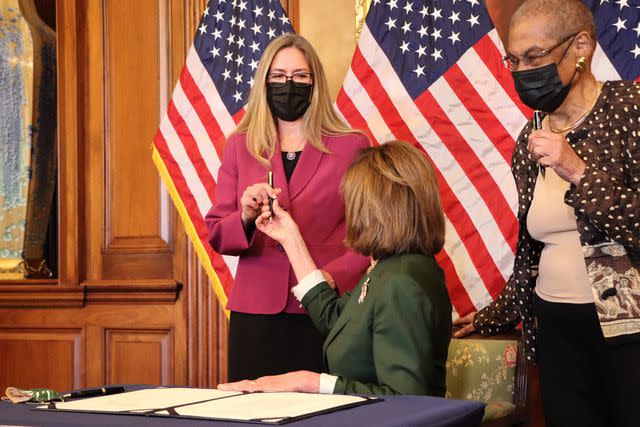
Courtesy of the Wexton Office
Speaker Nancy Pelosi and Rep. Jennifer Wexton hold a bill enrollment ceremony after Congress voted to award Capitol police officers the Congressional Medal of Honor for their bravery during the Jan. 6, 2021, riotWexton made the difficult decision last fall to not seek reelection in 2024, citing the challenges of legislating with PSP as too great to overcome. Her limited mobility makes common tasks more difficult, like getting ready for work in the morning or getting to votes on time, and she can no longer drive herself to work. Then there's the communication struggle.
“The most difficult thing is not being able to be understood as much as I’d like to be or as much as I used to be, especially as a former trial attorney and now a politician," she tells PEOPLE in a follow-up message after the interview. "It’s such a big part of this job, whether it’s talking with colleagues on the House floor where it’s very loud, or participating in committee hearings, or being out around my district meeting with constituents."
During her one-on-one interview with PEOPLE, her speech was soft, slurred and indistinguishable at times. In recent weeks, she's begun using a text-to-voice feature on her iPad in committee meetings and on the House floor so that others can understand her.
In her everyday conversations, though, roadblocks remain. Some colleagues have grown distant, unsure of how to maintain a relationship, and others have resorted to infantilization. People routinely underestimate her cognitive function, failing to see that behind the communication barrier lives the same mind that completed law school, successfully prosecuted a murderer and ran six political campaigns.
"It's really frustrating when people talk to me like a child," the congresswoman says.
But perhaps the hardest side effect of having "Parkinson's on steroids," as Wexton calls it, is watching her sons, Matthew, 21, and Jamie, 19, get anything but 100% from their mother.
"My kids are very hurt. It's hard seeing their mom like this"
Jennifer Wexton
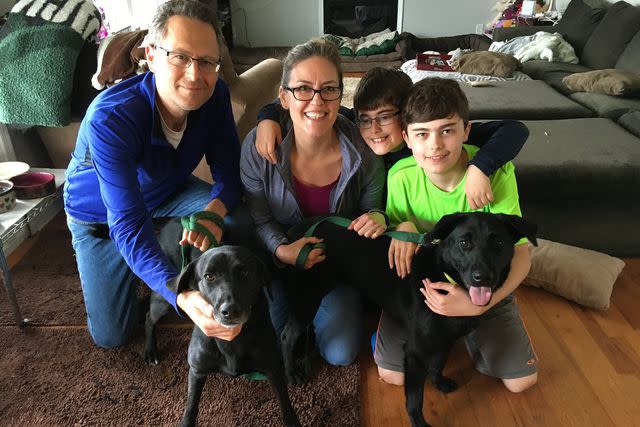
Courtesy of the Wexton family
An old family photo of Jennifer Wexton with her husband, sons and rescued Labrador retrieversWexton's sons are attending college in Virginia, allowing them to come home and visit frequently as she navigates complications from the disease.
"I like to think I can be vivacious and fun as a mom, but now it’s hard to communicate and have them fully understand what I’m saying," she says. "It’s really frustrating for them, I’m sure ... but they’re both good kids, they’re both working through it."
And the same goes for her husband, Andrew. She finds a moment of levity, cracking a smile mentioning him: "He teaches fourth grade, so he’s a patient person, obviously."
Despite the difficult period she's in, Wexton says, “I feel very lucky to be where I am right now, with a strong support network of family, friends and my staff."
Never miss a story — sign up for PEOPLE's free daily newsletter to stay up-to-date on the best of what PEOPLE has to offer.
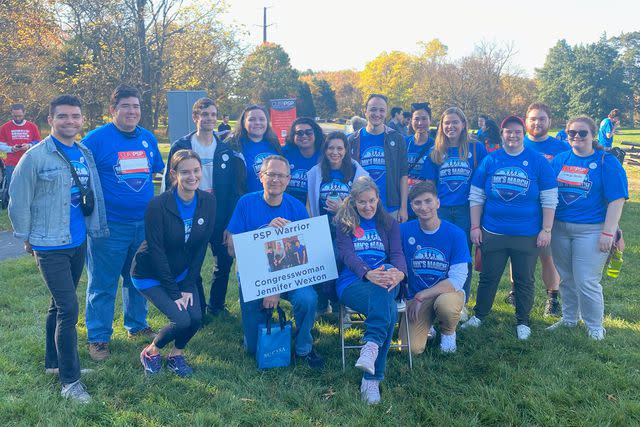
Courtesy of the Wexton Office
Jennifer Wexton — surrounded by staff, family and friends — attends the MK's March to raise money for PSP research on Oct. 28, 2023As Wexton prepares to vacate her seat, which will return the congressional district to battleground territory, her legislative priorities have shifted.
The congresswoman's staff are quick to tout her previous successes in expanding research around childhood cancer, supporting victims of abuse, improving mental health resources for Capitol police and holding the Chinese government accountable for human rights atrocities.
The team is also proud of Wexton's support for the transgender community amid nationwide attacks on LGBTQ rights, including hanging a trans pride flag outside her office on her first day in Congress. ("I want everyone in the trans community to know that they are welcome and loved," she told NBC News at the time.)
But with a rare neurological disorder — and an understanding of how Parkinson's can affect people's lives (her original Parkinson's support group let her "stick around" after she received the PSP diagnosis) — Wexton feels a duty to be "an advocate for those going through challenges like mine" in her final months on the job.
In December, the House passed the Dr. Emmanuel Bilirakis and Honorable Jennifer Wexton National Plan to End Parkinson’s Act in a near unanimous vote, which — if cleared in the Senate — will require the Department of Health and Human Services to coordinate a stronger plan for preventing, diagnosing, treating and curing Parkinson's and related diseases.
"Obviously much better than finding a cure and better treatment is never getting it in the first place," she says of the bill's efforts to prevent new cases.

Courtesy of the Wexton Family
Jennifer Wexton with her two Labrador retrievers, who were rescued by the family“I feel very blessed to be able to have this job," she says, reflecting on her achievements, before adding that there's more she had hoped to get done. "I'm sad I'm going to be leaving. It's going to be hard for me to be gone."
"I don't feel sorry for myself"
Jennifer Wexton
As of now, Wexton struggles to imagine life after retirement. "I can't just sit around and do nothing all day. It'd make me crazy," she admits. "It'd make my family crazy too."
When Wexton first learned that she had PSP, she and her loved ones agreed that the best thing to do is take things one day at a time, and she's sticking to that.
Her current plan is to enjoy sleeping in, feel grateful that she can take donor calls off her to-do list, spend plenty of time with friends, and exercise as much as she's able to help slow the progression of her disease.
Asked how she wants others to remember her decades of public service when she leaves, Wexton wastes no time responding: "I hope they hear that I fought everyday to make people’s lives better.”
For more People news, make sure to sign up for our newsletter!
Read the original article on People.


